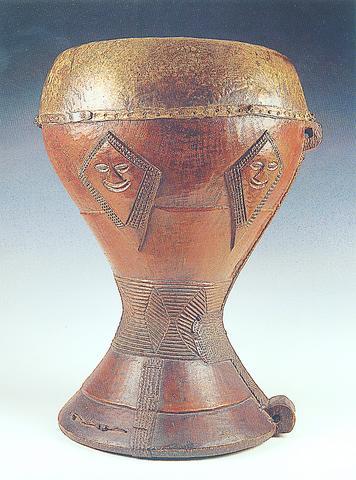It's appropriate that the National History Museum's current exhibition is titled Visions d'Afrique because, despite the extensive array of items presented in the collection, a look is all that it affords. Rather than shedding light on the dark continent, it remains shrouded in mystery.
This is hardly surprising given the history museum's track record when it comes to international exhibits. A recent exhibit of Mongolian art and artifacts raised more questions than it answered and its liberal use of official government facsimiles and telegraphs certainly did little to inspire the hordes of schoolchildren that are routinely trouped through the museum. One would have thought that the historical intersection of the Republic of China and Mongolia would have made for a more interesting
exhibition.

ALL PHOTOS COURTESY OF MUSEUM OF HISTORY
Now, with Visions d'Afrique, the rapport between Taiwan and its diplomatic allies in Africa was noticeable by its absence. A Friday afternoon press conference regarding the African exhibit was fascinating for its total lack of Africans. Instead, the media was treated to a show of mutual appreciation between the sponsors of the exhibition, the French Institute in Taipei and a Chinese-language newspaper.
Many of the items in the exhibit come from Malawi, Burkina Faso, Liberia and Senegal -- all Taiwanese allies -- and their representative offices are near the museum, but museum officials were offering thanks to the French, Belgians, Germans and other countries.
African representatives were conspicuous by their absence. Perhaps they would have been able to shed light on the exhibits, because the museum has not. A cane from Burkina Faso is carved with figures of a man and a woman. It's identifying tag tells you simply that it's a cane with figures of a man and woman carved in it. Not exactly insightful.
There are several information plaques throughout the exhibit, which covers nearly all the first floor of the museum, but are in Chinese and French only. There is no accompanying English-language information either in the exhibit or in any of it's literary materials. What visitors are left with are hundreds of objects, wildly imagined and exquisitely crafted, which fascinate and provoke a flood of questions that go unaddressed.
Most of the work seems to have been put into the gift shop at the exhibit's end. Two rooms have been given over to African furniture, crafts, musical instruments, calendars, stickers, even African-themed temporary tattoos.
It would have been better if the museum staff put as much effort into selling the exhibition as they have at selling trinkets; they would have an enlightening show on their hands rather than a curiosity shop.
Visions d'Afrique runs now through Feb. 22 at the National Museum of History (

On April 26, The Lancet published a letter from two doctors at Taichung-based China Medical University Hospital (CMUH) warning that “Taiwan’s Health Care System is on the Brink of Collapse.” The authors said that “Years of policy inaction and mismanagement of resources have led to the National Health Insurance system operating under unsustainable conditions.” The pushback was immediate. Errors in the paper were quickly identified and publicized, to discredit the authors (the hospital apologized). CNA reported that CMUH said the letter described Taiwan in 2021 as having 62 nurses per 10,000 people, when the correct number was 78 nurses per 10,000

As we live longer, our risk of cognitive impairment is increasing. How can we delay the onset of symptoms? Do we have to give up every indulgence or can small changes make a difference? We asked neurologists for tips on how to keep our brains healthy for life. TAKE CARE OF YOUR HEALTH “All of the sensible things that apply to bodily health apply to brain health,” says Suzanne O’Sullivan, a consultant in neurology at the National Hospital for Neurology and Neurosurgery in London, and the author of The Age of Diagnosis. “When you’re 20, you can get away with absolute

May 5 to May 11 What started out as friction between Taiwanese students at Taichung First High School and a Japanese head cook escalated dramatically over the first two weeks of May 1927. It began on April 30 when the cook’s wife knew that lotus starch used in that night’s dinner had rat feces in it, but failed to inform staff until the meal was already prepared. The students believed that her silence was intentional, and filed a complaint. The school’s Japanese administrators sided with the cook’s family, dismissing the students as troublemakers and clamping down on their freedoms — with

As Donald Trump’s executive order in March led to the shuttering of Voice of America (VOA) — the global broadcaster whose roots date back to the fight against Nazi propaganda — he quickly attracted support from figures not used to aligning themselves with any US administration. Trump had ordered the US Agency for Global Media, the federal agency that funds VOA and other groups promoting independent journalism overseas, to be “eliminated to the maximum extent consistent with applicable law.” The decision suddenly halted programming in 49 languages to more than 425 million people. In Moscow, Margarita Simonyan, the hardline editor-in-chief of the